

The Viking Age. Danish prehistory culminated in the Viking Age, the period from 800 until 1050 AD.
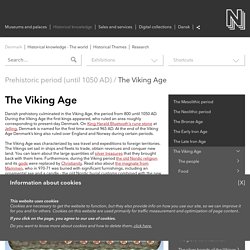
During the Viking Age the first kings appeared, who ruled an area roughly corresponding to present-day Denmark. On King Harald Bluetooth’s rune stone at Jelling, Denmark is named for the first time around 965 AD. At the end of the Viking Age Denmark’s king also ruled over England and Norway during certain periods. The Viking Age was characterized by sea travel and expeditions to foreign territories. The Vikings set sail in ships and fleets to trade, obtain revenues and conquer new land. Medieval History. Medieval History Web Sites Turning the Pages Turning the Pages is an award-winning interactive display system developed by The British Library to increase public access and enjoyment of some of its most valuable treasures.

Visitors are able to virtually “turn” the pages of manuscripts in a realistic way, using touch-screen technology and animation. There are currently fifteen treasures on display in Turning the Pages and several coincide with the Medieval period: Pinnacle of Anglo-Saxon Art depicts the priceless Lindisfarne Gospels, one of the most magnificent manuscripts of the early Middle Ages. The Lisbon Hebrew Bible depicts Jewish cultural life in Portugal prior to expulsion and forced conversions in December 1496.
History education learning resources. The civilization of the ancient Greeks. This article deals with the civilization of Classical Greece. Other articles cover the Minoan civilization, which preceded it, and the Hellenistic civilization, which followed it. Overview and Timeline of Ancient Greek Civilization The civilization of Ancient Greece emerged into the light of history in the 8th century BC. Normally it is regarded as coming to an end when Greece fell to the Romans, in 146 BC. However, major Greek (or “Hellenistic”, as modern scholars call them) kingdoms lasted longer than this. About Us. History is often interpreted as something that happened a long time ago: a stagnant, unmoving moment in time that has little to no impact on our busy modern lives.

Yet historians, archaeologists, and scholars are making new discoveries about the past every day, and our shared past serves as the theme for countless movies, novels, and games. History is a living, breathing entity that is constantly changing, moving, and happening all around us. Medievalists.net offers readers the chance to learn and experience what is new in history by providing comprehensive coverage of news, books, articles, games, movies, pop culture and more.
Medievalists.net‘s founders Sandra Alvarez and Peter Konieczny met each other while in the University of Toronto’s Medieval Studies program and became fast friends. After graduation, Peter continued onto get his master’s, while Sandra went on to college and the workforce. Medievalists.net‘s first post was uploaded on September 16, 2008. 1320 Index Page. Historical Maps, French Revolution 1789-1799. History of Europe - 6013 years in 3 minutes. Napoleon PBS Documentary 1 Of 4. The Unification of Germany. The Unification of Italy. Wars of German unification - Bismarck second German Empire 1871 history. During the summer of 1849, and into the summer of 1850, the Prussian Government invited other north German States to enter into a fresh "Erfurt" union on the basis of a new Constitution - to be that accepted by the Frankfurt Parliament of 1848, but altered so far as might be found necessary.

The union was to be a voluntary one. Had this policy succeeded, the Prussia that was most dear to Bismarck's heart would have been no more. Otto von Bismarck was a Prussian aristocrat and was, as such, opposed to this policy of the King of Prussia and his ministers. He took the extreme particularist view; he had no interest in Germany outside Prussia; Wuertemberg and Bavaria were to him foreign States. In all these proposals for a new Constitution he saw only that Prussia would be required to sacrifice its complete independence; that the King of Prussia would become executor for the decrees of a popular and alien Parliament. Europe. Europe is the second smallest of the seven continents covering roughly 2% of the earth’s surface.
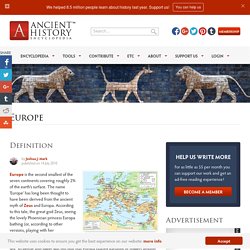
The name 'Europe’ has long been thought to have been derived from the ancient myth of Zeus and Europa. According to this tale, the great god Zeus, seeing the lovely Phoenician princess Europa bathing (or, according to other versions, playing with her handmaidens) by the sea shore, transformed himself into a magnificent white bull and slowly approached her from the sea. Europe. Europe. The Ancient World. E pluribus unum: "out of many – one".
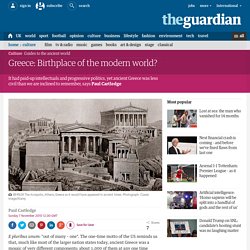
The one-time motto of the US reminds us that, much like most of the larger nation states today, ancient Greece was a mosaic of very different components: about 1,000 of them at any one time between c600BC and AD330. That is, there were a thousand or so separate, often radically self-differentiated political entities, most of which went by the title of polis, or citizen-state. Our term "Greece" is derived from the Romans' Latin name, Graecia, whereas the ancient Greeks spoke of Hellas – meaning sometimes the Aegean Greek heartland, at other times the entire, hypertrophied Hellenic world – and referred to themselves as "Hellenes". In the foundational epics attributed to Homer, however, you won't find Greeks referred to as "Hellenes" but as "Achaeans", "Danaans", or "Argives".
Everyone who was not a Hellene by birth, language or culture was labelled a barbaros. Greek Philosophy. Who are we?

How can we be happy? Does the universe have a purpose? Greek philosophers approached the big questions of life sometimes in a genuine scientific way, sometimes in mystic ways, but always in an imaginative fashion. Ancient Rome - Classical Literature. Greek History. Ancient Greece Timeline According to archaeological and historical sources the story of Greece began deep in prehistory, and has continued to our days.
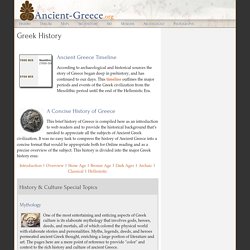
This timeline outlines the major periods and events of the Greek civilization from the Mesolithic period until the end of the Hellenistic Era. A Concise History of Greece This brief history of Greece is compiled here as an introduction to web readers and to provide the historical background that’s needed to appreciate all the subjects of Ancient Greek civilization. Greek and Roman History. The South American slave trade · Manchester Historian. Histories of the Trans-Atlantic Slave Trade typically focus on those enslaved in the North American colonies and often overlook its Southern counterpart.

However, those enslaved in North America during the colonial period were a minority; only 6% of Africans were taken to the East Coast of North America between 1500 and 1870. Slave imports from Africa were overwhelmingly taken to South America and the Caribbean. Although the Southern United States is renowned for its past brutality towards the slave population, those enslaved in areas such as Brazil, Colombia and Bolivia experienced a much harsher reality.
Yet, not unlike North America, slavery existed in South America even before African slave importation transformed the region’s landscape. P.25 - Europe in 1300. The Holy Roman Empire in 1300 I've already briefly described the Holy Roman Empire; here, I offer this map as a way to visualize it.
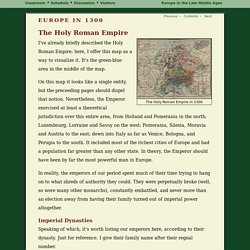
It's the green-blue area in the middle of the map. On this map it looks like a single entity, but the preceeding pages should dispel that notion. Nevertheless, the Emperor exercised at least a theoretical jurisdiction over this entire area, from Holland and Pomerania in the north; Luxembourg, Lorraine and Savoy on the west; Pomerania, Silesia, Moravia and Austria to the east; down into Italy as far as Venice, Bologna, and Perugia to the south.
It included most of the richest cities of Europe and had a population far greater than any other state. In reality, the emperors of our period spent much of their time trying to hang on to what shreds of authority they could. Imperial Dynasties. Nineteenth Century Europe — UMass Boston OpenCourseware. Modern European History : nineteenth century History of Europe links. Historians tend to divide the study of history into "relatively distinct" or "relatively manageable" periods or epochs. Examples being:- History Facts/Science Facts - Quatr.us. South America Timeline - Timeline of South America. South America Timeline: Log In to Canvas. A timeline of Latin America. The Making of Europe 1 - CLASSICAL CIVILIZATION - Early European History.
From Hutton Webster's, Early European History (1917); edited for this on-line publication, by ELLOPOS. Classical Period, 900 - 290 BC. History of Greece. Ancient Greece. The Roman Empire. British History. A guide to the WW1 battlefields and home to the Poppy Umbrella. International Society for First World War Studies Information Page. The Society was founded in 2001. International Society for First World War Studies brings together postgraduates and more established academics who study the First World War. The Ancient World.
Europe. All Empires: Online History Community. History Moments – Ages of History Series. By Jack Le Moine How to classify the historical eras in a way that makes sense? Reformation Magazine. A Young Hare,Albrecht Dürer. Europe in the Age of the Reformation. This site is intended for multiple audiences: my students, other teachers, and the general public. Anyone is welcome to browse through any part of the site. Europe in the Late Middle Ages. This site is Dr.
Knox's online course on the Late Middle Ages. The Crusades - home page. Return from the Crusade by Karl Friedrich Lessing Rheinisches Landesmuseum This site is a fully virtual course offered through Boise State University. Classroom page - History of Western Civilization, Knox. The Crusades - home page. How Did the Crusades Affect European Economy? GREAT MILITARY BATTLES. Internet History Sourcebooks. Encyclopedia of Philosophy. The Internet Classics Archive: 441 searchable works of classical literature. All Empires: Online History Community. Worldology. Classic Age. Classical Mediterranean and Europe - All Empires. Japanese Sign Final Surrender 日本の降伏. History - World Wars: The Origins of World War One. Information about historylearningsite.co.uk: History Learning Site. A short history of nearly everything!
Sistine Chapel. Historical Texts Collection : History Department : Hanover College. Europe in the Contemporary World: 1900 To the Present, A Narrative History With Documents, First edition. Europe 1700-1914. 19th Century.